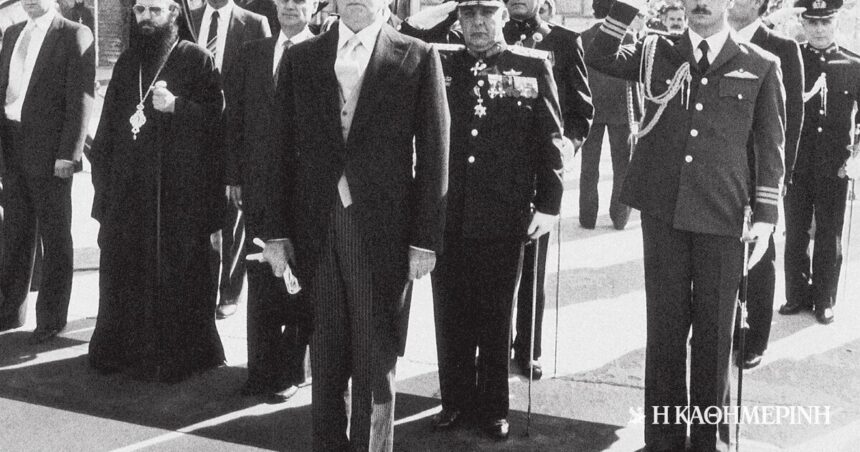A major turning point, such as the 1981 elections for Greek political history, always raises a wide variety of questions. Even if PASOK and Andreas Papandreou expected their massive victory (which is doubtful), it is important to highlight the attitudes and attitudes of the remaining protagonists, both before and after the election. This article will examine the attitude of Constantinos Karamanlis, President of the Republic in 1981, towards the electoral contest and its outcome. This examination is possible because he made available the personal notes he kept on this matter in February 1982, shortly after the election.
The start of a new election season
The 1981 elections were a turning point in Greek political history, as they formed a new landscape of electoral relations which would be maintained for thirty years and would differ radically from that of the previous three decades. Indeed, from the electoral victory of Alexandros Papagos in 1952 to the elections of 1981, the new form of the Center Right (which in a first form was created by Papagos with the Hellenic Alarm) electorally approached, alone, 45%-50% of the votes, while the remaining half of the electorate was divided between the Left and the Center, who had huge political differences, while for most of the period the Center itself was divided into parties bitterly hostile to each other. Even in the two cases in which Karamanlis had won the elections with a relatively lower percentage (around 42% in 1958 and 1977), there was another more conservative political formation to his right (pro-royalist in 1977), which meant that the overall strength of the Right again approached half the electorate and it was simply the lack of a visible government challenge to Karamanlis – both times – that tended to partially demoralize his party’s percentages. In this environment and with enhanced proportional or majoritarian electoral systems, the Center Right in its various forms (Hellenic Alarm, ERE, New Democracy) was in an almost dominant position against a divided opposition. The only time this had been challenged was in the 1963 and 1964 elections, but the Center Union had failed to maintain its unity immediately after its 1964 triumph.
Of course, in 1981 the future was uncertain and the broad electoral alliance of PASOK was far from certain to be preserved intact. This was confirmed only in the 1985 elections, when he repeated his high percentage. However, as it turned out, a new electoral era began in 1981, in which PASOK found itself in a correspondingly advantageous – dominant position, as it reached 45%-48% of the vote with relative ease, with the rest of the electorate divided between the Left and the Center Right. The “ceiling” of the center-left vote was 48% in 1981 and its low performances 38% in 2007, while the ceiling of the ND. 47% in 1990 (after three elections) and the low 36% in 1981 and 33.5% in 2009. Thus, the maximum and minimum of PASOK in these thirty years were higher than the counterparts of the ND. In this context, from 1981 to 2009 and the outbreak of the financial crisis, PASOK won six elections (1981, 1985, 1993, 1996, 2000, 2009), while ND. only three (1990, 2004, 2007) and indeed two marginally (150 seats in 1990 and 152 seats in 2007). 1981 was the turning point that finally led to a thirty-year electoral supremacy of PASOK.

The predictions were solemnly disproved
Karamanlis – like the leadership of the ND – did not expect PASOK’s great electoral victory. As he states in his notes, “however, the general impression was that no party would secure an absolute majority and that New Democracy would certainly precede PASOK”. He based this prediction on the two parties’ wide margin in the previous election (42%-25%), as well as (implicitly) his own departure from the party leadership, which seemed to remove a key reason why many royalists had defected from the N.D. in 1977.
With these facts, Karamanlis expected to be called upon to play a stabilizing role. For this reason, after all, he was unhappy with the agreement of Georgiou Ralli and Andreas Papandreou to hold early elections on October 18: something like this, as he writes, deprived him under the Constitution of the possibility to dissolve the Parliament for a year.
In other words, as is evident from Karamanlis’ notes, he, but probably also the leadership of the ND, had not realized what was coming. They interpreted the possible developments based on the dynamics of the previous period (1952-1977). In addition, the references to the impossibility of achieving self-reliance and the possibility of new elections leave room for the hypothesis that perhaps they saw the rise of PASOK as a “parenthesis”, something they will solemnly deny. However, this tendency, i.e. the space previously favored by developments not being able to distinguish the structural change that is coming, also appeared in the case of the centrist leaders (S. Venizelou and N. Plastira) in 1950-51, when they took it for granted that the political system would in one way or another guarantee the permanent governmental presence of the Center, as had happened continuously until then, and they did not expect the long-term electoral dominance of the new Center-Right that Papagos would inaugurate.

Complex process of maneuvering between the government and the President
In any case, Karamanlis notes not only his surprise but also his disappointment with the result of October 1981, primarily because PASOK had announced a policy that could challenge Greece’s integration into the West, which he himself had just achieved . Karamanlis was determined on the one hand, if necessary, to defend this choice of life for the country, but at the same time he wished to avoid conflict with PASOK, hoping that it would adopt a western orientation. In such a case, he stressed, “it could perhaps prove more generally useful for this party to leave power”. In addition, however, he noted that the result of the elections had deprived him of important levers of pressure. On the one hand, it was becoming difficult to announce new early elections. On the other hand, he could no longer threaten to resign from the presidency and, if necessary, go down again to new elections that would be provoked in this way: and this because the N.D. it no longer had the possibility, with its 115 deputies, to prevent the election of a new President of the Republic, and therefore to trigger new elections. The only threat he had left, he said, was that of calling a referendum. At the same time, however, he estimated that, just as he himself did not wish for a conflict with PASOK, so PASOK would also like to avoid such a confrontation with him. In other words, a complex process of maneuvering between the government and the President was beginning in the new setting.
In any case, Karamanlis made sure that there were no misunderstandings that the head of state honestly accepted the election result. Such a thing (or even the perception that such a thing was happening) has in the past had a poisonous effect on the political system. Four days before the elections, when he was informed that the chiefs of staff had decided to resign in the event of PASOK’s victory, due to its anti-Western declarations, he discouraged them and advised them to remain in their positions. He did the same on election night: Karamanlis ensured that the leadership of the Armed Forces remained in place. He did the same the next day with the leaders of the Security Forces, who had also decided to resign. Karamanlis considered that his interventions had provided important services to the country, as it could have caused a crisis or the impression internationally that democracy in Greece was not safe.
His attitude, in the first days of PASOK’s decisive victory, was indicative. As surprised as he was (or scared – but he doesn’t say that explicitly), he was determined to respect the result of the election and, above all, to make sure it was clear to everyone that the result would be respected. He did not rule out the possibility of a rift with the new prime minister over issues of existential importance for the country, but he wished to avoid it. Karamanlis had created state normality in 1974-75, in a country that had been tormented by repeated internal divisions since 1915, and he was determined to defend that normality. This will also be the criterion of his actions in the coming years.
Mr. Evanthis Hatzivasiliou is a professor at the Department of History and Archeology of the University of Athens, secretary general of the Foundation of the Parliament for Parliamentaryism and Democracy.




